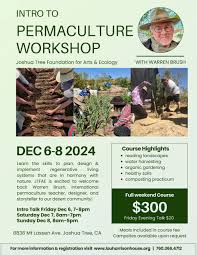Welcome to the Introduction to Permaculture Course!
Permaculture is a holistic approach to sustainable living that integrates design principles inspired by nature. If you are curious about permaculture and eager to learn how you can apply its principles in your life, this course is the perfect starting point.
What to Expect:
During this course, you will explore the core principles of permaculture, including:
- Observing and interacting with nature
- Designing sustainable systems
- Using resources wisely
- Cultivating diversity
- Promoting resilience
You will learn how permaculture can be applied to various aspects of life, such as gardening, agriculture, water management, energy efficiency, and community building.
Course Structure:
This course consists of both theoretical knowledge and hands-on practical activities. You will engage in group discussions, design exercises, site visits, and workshops led by experienced permaculture practitioners.
Benefits of Taking This Course:
By completing this introduction to permaculture course, you will gain:
- A deeper understanding of ecological principles
- The ability to design sustainable systems in your home or community
- Inspiration for living a more harmonious and regenerative lifestyle
- A network of like-minded individuals passionate about sustainability
Join Us on This Journey:
Embark on a transformative learning experience that will empower you to make positive changes in your life and contribute to a more sustainable world. Enroll in our Introduction to Permaculture Course today!
Introduction to Permaculture: Answering Your Top 6 Questions
- What are the basics of permaculture?
- How to start learning about permaculture?
- How long does it take to learn permaculture?
- What is a permaculture course?
- Where do I start with permaculture?
- What is the study of permaculture?
What are the basics of permaculture?
When exploring the basics of permaculture, it is essential to understand that permaculture is a design system that mimics natural ecosystems to create sustainable and regenerative environments. At its core, permaculture emphasizes principles such as observing and interacting with nature, utilizing resources efficiently, promoting diversity, and fostering resilience. By incorporating these fundamental principles into design practices for gardening, agriculture, water management, energy systems, and community development, individuals can cultivate harmonious relationships with the environment while enhancing sustainability and productivity. Understanding the basics of permaculture provides a solid foundation for creating holistic and ecologically sound solutions to address various challenges in today’s world.
How to start learning about permaculture?
To begin your journey into learning about permaculture, a great starting point is to enroll in an Introduction to Permaculture Course. These courses provide a comprehensive overview of permaculture principles and practices, offering a structured approach to understanding how to apply sustainable design concepts in various aspects of life. By participating in such a course, you will gain valuable insights, practical skills, and inspiration to start incorporating permaculture principles into your daily life and surroundings. Additionally, engaging with experienced practitioners and like-minded individuals in the course can further enrich your learning experience and provide a supportive community as you embark on your exploration of permaculture.
How long does it take to learn permaculture?
The duration to learn permaculture varies depending on individual goals, commitment, and the depth of knowledge desired. While a basic understanding can be gained in a short period through introductory courses or workshops, mastering permaculture principles and practices may require months or even years of study and hands-on experience. Continuous learning and application are key to fully grasping the complexities of permaculture design and implementation. Remember, permaculture is not just a skill to acquire but a lifelong journey of observation, learning, and adaptation in harmony with nature.
What is a permaculture course?
A permaculture course is an educational program that introduces participants to the principles and practices of permaculture, a sustainable design system rooted in mimicking natural ecosystems. Through a permaculture course, individuals learn how to observe and work with nature to create regenerative and resilient systems that benefit both people and the planet. Participants explore topics such as ecological design, organic gardening, water conservation, renewable energy, and community building. By taking a permaculture course, individuals gain the knowledge and skills needed to apply sustainable practices in various aspects of their lives, fostering a deeper connection to the environment and promoting long-term sustainability.
Where do I start with permaculture?
When wondering where to start with permaculture, it’s essential to begin by exploring your personal interests and goals within the realm of sustainable living. A great entry point is to enroll in an Introduction to Permaculture Course, where you can gain foundational knowledge about permaculture principles and practices. Through this course, you will learn how to observe and interact with nature, design resilient systems, and cultivate diversity in your surroundings. By taking this first step, you will be equipped with the tools and inspiration needed to embark on your permaculture journey and make a positive impact on both your immediate environment and the wider world.
What is the study of permaculture?
The study of permaculture revolves around understanding and applying sustainable design principles that mimic natural ecosystems to create harmonious and regenerative human environments. Permaculture emphasizes observing and learning from nature’s patterns, cycles, and relationships to design systems that are efficient, resilient, and ecologically sound. By integrating elements such as organic gardening, water conservation, renewable energy, and community building, the study of permaculture aims to foster a more sustainable way of living that benefits both people and the planet.

